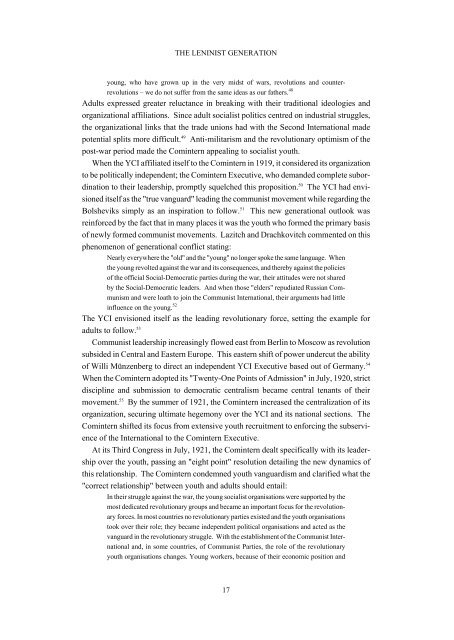Joel A Lewis Youth Against Fascism.pdf
Joel A Lewis Youth Against Fascism.pdf
Joel A Lewis Youth Against Fascism.pdf
You also want an ePaper? Increase the reach of your titles
YUMPU automatically turns print PDFs into web optimized ePapers that Google loves.
THE LENINIST GENERATION<br />
young, who have grown up in the very midst of wars, revolutions and counterrevolutions<br />
– we do not suffer from the same ideas as our fathers. 48<br />
Adults expressed greater reluctance in breaking with their traditional ideologies and<br />
organizational affiliations. Since adult socialist politics centred on industrial struggles,<br />
the organizational links that the trade unions had with the Second International made<br />
potential splits more difficult. 49 Anti-militarism and the revolutionary optimism of the<br />
post-war period made the Comintern appealing to socialist youth.<br />
When the YCI affiliated itself to the Comintern in 1919, it considered its organization<br />
to be politically independent; the Comintern Executive, who demanded complete subordination<br />
to their leadership, promptly squelched this proposition. 50 The YCI had envisioned<br />
itself as the "true vanguard" leading the communist movement while regarding the<br />
Bolsheviks simply as an inspiration to follow. 51 This new generational outlook was<br />
reinforced by the fact that in many places it was the youth who formed the primary basis<br />
of newly formed communist movements. Lazitch and Drachkovitch commented on this<br />
phenomenon of generational conflict stating:<br />
Nearly everywhere the "old" and the "young" no longer spoke the same language. When<br />
the young revolted against the war and its consequences, and thereby against the policies<br />
of the official Social-Democratic parties during the war, their attitudes were not shared<br />
by the Social-Democratic leaders. And when those "elders" repudiated Russian Communism<br />
and were loath to join the Communist International, their arguments had little<br />
influence on the young. 52<br />
The YCI envisioned itself as the leading revolutionary force, setting the example for<br />
adults to follow. 53<br />
Communist leadership increasingly flowed east from Berlin to Moscow as revolution<br />
subsided in Central and Eastern Europe. This eastern shift of power undercut the ability<br />
of Willi Münzenberg to direct an independent YCI Executive based out of Germany. 54<br />
When the Comintern adopted its "Twenty-One Points of Admission" in July, 1920, strict<br />
discipline and submission to democratic centralism became central tenants of their<br />
movement. 55 By the summer of 1921, the Comintern increased the centralization of its<br />
organization, securing ultimate hegemony over the YCI and its national sections. The<br />
Comintern shifted its focus from extensive youth recruitment to enforcing the subservience<br />
of the International to the Comintern Executive.<br />
At its Third Congress in July, 1921, the Comintern dealt specifically with its leadership<br />
over the youth, passing an "eight point" resolution detailing the new dynamics of<br />
this relationship. The Comintern condemned youth vanguardism and clarified what the<br />
"correct relationship" between youth and adults should entail:<br />
In their struggle against the war, the young socialist organisations were supported by the<br />
most dedicated revolutionary groups and became an important focus for the revolutionary<br />
forces. In most countries no revolutionary parties existed and the youth organisations<br />
took over their role; they became independent political organisations and acted as the<br />
vanguard in the revolutionary struggle. With the establishment of the Communist International<br />
and, in some countries, of Communist Parties, the role of the revolutionary<br />
youth organisations changes. Young workers, because of their economic position and<br />
17

















